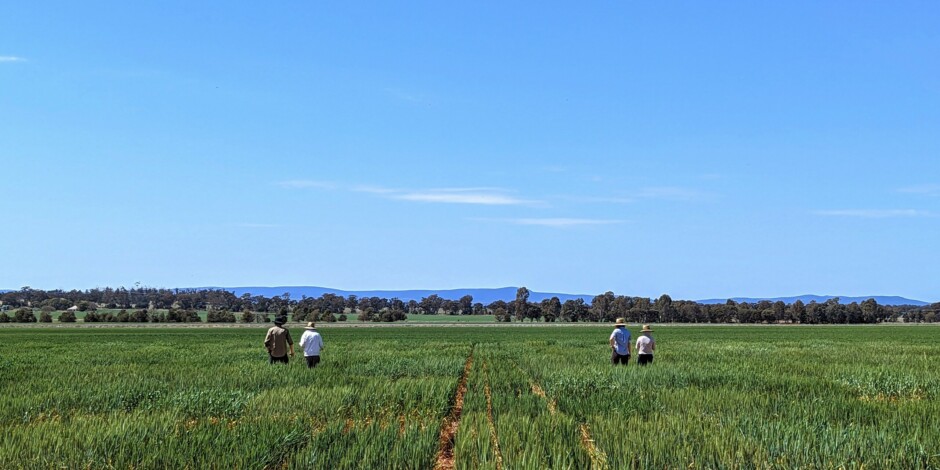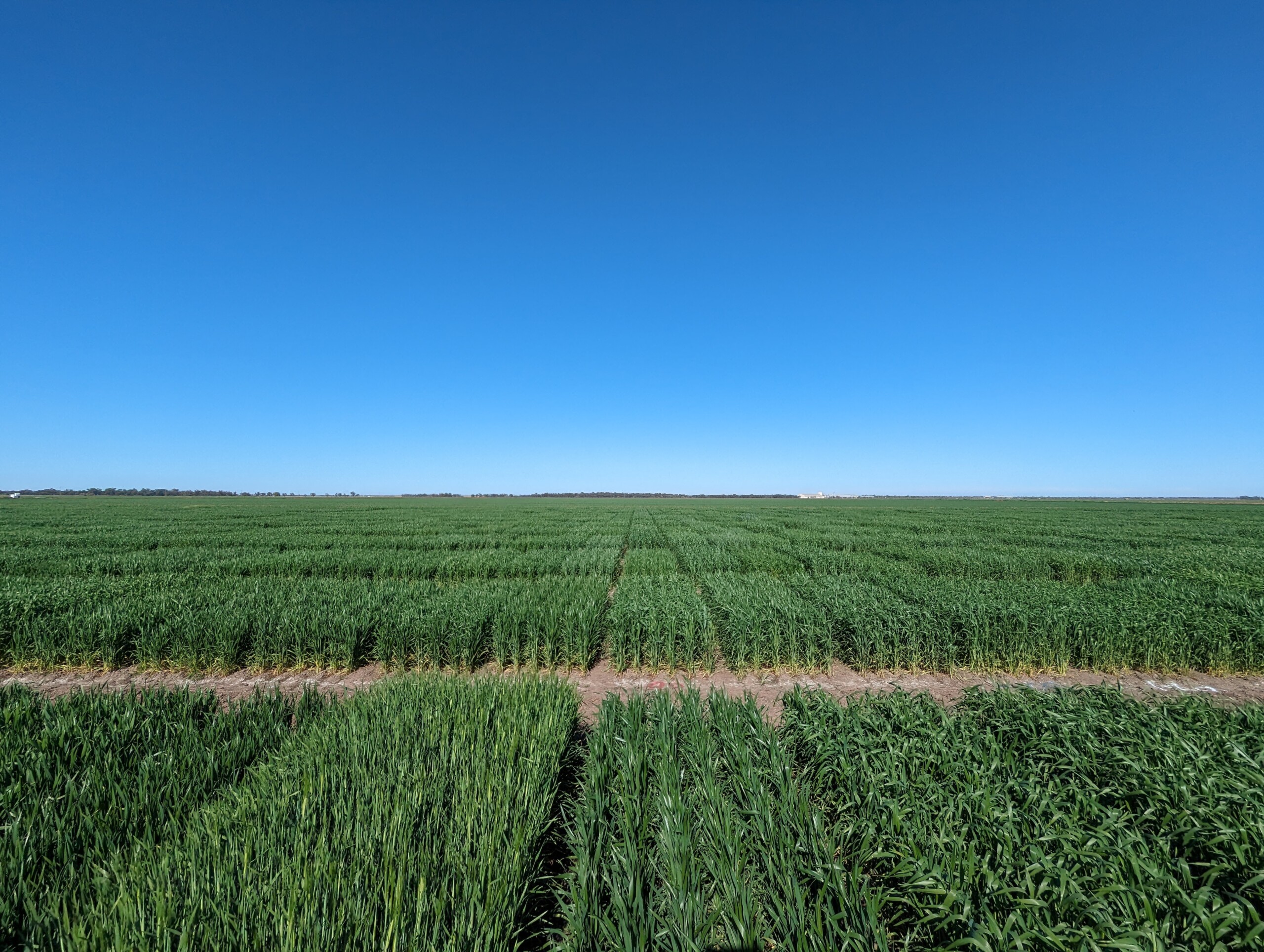The race to breed heat tolerant wheat for a hotter, hungrier world
Plant breeders are in a race against time to deliver crop varieties that can survive more frequent, prolonged, and severe heat events. A new research project by The Agrifood Innovation Institute is helping plant breeders accelerate the development of heat tolerant wheat – and insure the global food system against climate-induced harvest failures.

“Even in a well-watered environment, once you get air and leaf temperatures above 43°C, a plant’s ability to photosynthesise is seriously degraded. By 50°C, photosynthesis stops. By 60°C, the ‘engine room’ that powers every cell – mitochondria – shuts down.”
“That’s a pretty good definition of death.”
Professor Owen Atkin understands those temperatures – that are approaching the ‘thermal limits of life’ – are more crucial than ever in a world that endured its hottest month on record in July 2023.
“Your reaction to those numbers might be, ‘That’s okay; we don’t get to 60°C.’ But they reached 52°C this year in China for the first time, and around 54°C in the US,” Owen said.
“Parts of inland Australia are already reaching peak temperatures of 50°C, and with the frequency, severity, and duration of heat events becoming more pronounced, we’ve got to equip farmers with tools that enable them to keep producing on those landscapes.”
Director of the Agrifood Innovation Institute (AFII) (formerly Centre for Entrepreneurial Agri-Technology (CEAT)) at the Australian National University, Owen is leading a collaborative research project aimed at helping Australian plant breeders accelerate the development of heat tolerant wheat varieties.

Professor Owen Atkin is leading a collaborative research project aimed at helping Australian plant breeders accelerate the development of heat tolerant wheat varieties.
RELATED: Industry and research join forces to tackle complex agricultural challenges
It’s important – existential – work for the future of the grains industry, both here and overseas.
“Temperature is a key player influencing yield resilience,” Owen said.
“Past modelling work by CSIRO at Merredin, in WA’s wheatbelt, showed just a 1°C increase in average growing season temperature led to an 11% drop in water-limited yield.”
“And it’s a global problem. To maintain food security, we’ve got to get ahead of the curve and provide growers with wheat more capable of withstanding high temperatures, temperatures that, for our current varieties, would be enough to cause harvest failure.”
Global collaboration for a global challenge
Funded by the Grains Research and Development Corporation, the four-year project uses cutting-edge technology and data science to quantify how heat impacts the growth and yield of wheat plants – providing plant breeders with never-before-held knowledge about precisely which traits boost heat tolerance.
RELATED: Three WA innovators harnessing the potential of seaweed
In collaboration with cereal breeding company InterGrain, Australian universities (Uni Sydney, Uni WA and Uni New England) and overseas partners – the International Maize and Wheat Improvement Center (CIMMYT) in Mexico, and Lancaster University and Essex University in the UK – ANU researchers are analysing 200 lines of Australian and international wheat at trial sites across NSW and WA.
Optimising the ‘yield potential equation’
Advances in plant breeding techniques have meant that, for the last few decades, plant breeders have achieved around 0.5 – 1% growth in yield potential every year.
RELATED: Responsible innovation and a call to action
Owen explained that the “compound interest” has allowed us to maintain food production well in line with or exceeding population growth, without expanding the amount of land that’s needed.
“But if we’re going to feed a population of 10 billion in 2050, we need 2.5% growth in yield potential. And traditional techniques used by plant breeders just can’t deliver that.
“We need to look for the parts of the yield potential equation that, because of a lack of available technologies, haven’t been maxed out yet. And that’s where we’re focused – using robotic systems to identify crops more able to convert light into biomass under higher and higher temperatures.”

The four-year project uses cutting-edge technology and data science to quantify how heat impacts the growth and yield of wheat plants.
Adding new tools to the breeding toolkit
At the end of the project, the team aim to provide plant breeders with a reflective light-based screening tool capable of screening 1,000 plants per day for their photosynthetic performance.
“By just clipping the sensor on the leaf, and using the web-based interface, plant breeders will be able to quickly understand good vs poor photosynthesis – helping to inform breeding selection,” Owen explained.
Tools like that are only possible because of the cross-disciplinary expertise that a centre like AFII brings together.
RELATED: Balancing the emissions budget: The interplay of lifestyle, technology and sustainability
“We’ve got computer scientists managing the machine learning and AI elements; technologists working on the instruments and robotics; biologists; and a plant breeder who’s interfacing with our industry partner, InterGrain,” Owen said.
Shared purpose drives evokeAG. 2024 partnership
AFII has partnered with AgriFutures evokeAG. again in 2024 as a Strategic Partner for its two-day event in Perth, with Owen citing strong synergies between the two organisations.
“ANU will never be an agricultural college, but there is an exciting opportunity for AFII and the wider ANU community to contribute agrifood challenges in ways that are not business as usual.
“And I think that’s shared with the way AgriFutures approaches its role within the agrifood sector, championing a cross-disciplinary, collaborative approach to solving key challenges.”
Delegates who arrive at the evokeAG. 2024 event in Perth, WA, will notice the insignia of a rebranded AFII.
“From 1 January 2024, what was formerly the Centre for Entrepreneurial Agri-Technology (CEAT) become the Agrifood Innovation Institute,” Owen explained.
“And the reason is simple – we’ve moved beyond just agritech. The challenges facing the sector require us to take more of a systems approach, and understand how customers, regulators, and policy makers interface with industry and researchers. Those are areas where ANU can make a meaningful contribution.”
A moonshot for ag innovation
Australia is globally renowned for its investment in agrifood innovation, with our Research and Development Corporations (RDCs) and Cooperative Research Centres (CRCs) the envy of the world.
“What we lack is the capacity as a nation to work, at scale, on complex intergenerational challenges,” Owen explained.
“Challenges where the solutions might require an investment over 10 or 20 years.
“Not many countries do, so it’s becoming more accepted internationally that we need to look again at what was learned from the ‘moonshot’ – that decade-long, outcome-driven investment to put man on the moon.”
Owen wants the agrifood community to start thinking about our ‘moonshot’ for the next generation of farmers.
“Knowing that it’s going to be so hot that we literally won’t be able to farm in some areas – unless we use the nation’s incredible research and development capabilities in a different way.
“A way that’s more ambitious, more visionary, more long-term, more coordinated, and more collaborative. Only then can we achieve the truly transformational outcomes needed to deliver sustained food security in the face of what’s to come.”
As we teeter on the edge of major global challenges, do you want to learn more about how exceptional researchers like AFII are tackling these problems head on? From feeding the world, to climate, resource management and beyond, evokeAG. 2024 will explore the exceptional edge of agrifood tech innovation and the role it will play in addressing these challenges.
Hear more about the opportunity for innovation in agrifood at evokeAG. 2024 in Perth, Western Australia on the 20-21 February. Tickets are now on sale.
